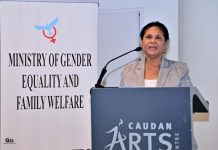Africa-Press – Mauritius. Post-legislative analyzes of December 2014, that carried out by the study circle on electoral behavior and strategies, O. R. A. C. (Opinion Research Analysis Consult), seems to me to be the most relevant and coherent (Read: ‘Quasi-certainties and certainties’, Mauritius Times June 1, 2018).
According to its figures which seem reliable to me and which I round off, out of all the voters registered in 2014, the MSM represented a force of 25%, of which 20% are traditionally Labor voters who “fired” for reasons that we knows, in particular because of the promises of an “economic miracle” — meaning more concretely a growth rate of at least 7% — and an end to corruption-nepotism, etc.
These commitments have obviously not been respected. In addition, the somewhat sectarian slippages and the nonsense of each other of the government majority constitute a very serious handicap.
However, to hope to play the leading role in the next legislative elections without a “big” partner, the MSM must, on the one hand, retain the “viré mam” of 2014 – which is far from certain despite the festival of gifts which started – and, on the other hand, to bite into the only reservoir available to it, namely the Labor “hardcore”.
But this core – 15% of the electorate according to ORAC – which can be described as very tough since it withstood the exceptional tsunami of 2014, will not budge. Therefore, the MSM and its partner, the Mouvement Libérater, in sharp decline, cannot hope to retain power without an alliance with a “big party”.
This “big party” can only be the MMM, despite its 15% in 2014 according to ORAC, hence the thinly veiled genuflections in an interminable “koz-kozé” with a resolutely intransigent MMM whose electoral base is fundamentally hostile to any pre-election alliance.
Two of Bérenger’s conditions do not seem to pose a problem to me: 1) 50-50 split of tickets, and 2) his blacklist of undesirables. There’s quite a trail – from Soodhun to the gang to Collendavelloo to the defectors.
The third condition is of course the electoral reform that the MSM finally wanted to offer as a “dowry” to the MMM. However, Bérenger snubbed her. For the moment…
Pending the acceptance of a fourth condition that I consider decisive: the sharing of the prime ministership and its terms. So the “koz-kozé” will probably resume but on the basis of Bérenger’s conditions.
It must be said that the hostility of the MMM electoral base is such that to sell an alliance with the MSM, Bérenger has no choice but to be particularly demanding.
He wants, for example, that the electoral reform be perceived as that of the MMM, even if, in fact, there would be details to review. This question is obviously linked to that of the modalities of the Prime Ministerial division.
If there is no agreement on the prime ministership, the revised reform to please the MMM will be rejected. As for the ruling of the Privy Council in the Medpoint case, I am not sure that it will change Bérenger’s inflexible position.
Consider the following: The ruling is favorable to Pravind Jugnauth. However, this will not change the electoral arithmetic in any significant way. He will always need the MMM to hope to win.
Admittedly, on the ethical level, Bérenger will feel more at ease in the negotiations of alliance, however this definitive “laundering” of Jugnauth will not make him yield on his conditions.
The ruling is unfavorable to Pravind Jugnauth. There would then be two possibilities: Pravind Jugnauth does not let go of the prime minister’s chair. The alliance will then be definitively buried.
Pravind Jugnauth “steps aside”. Negotiations will resume with whoever will replace him at the head of the country with a good chance of success if Nando Bodha is appointed. This is the only scenario that makes an MMM-MSM alliance possible. Only the MMM can hope to win
As I had already underlined, the politico-electoral chessboard in the current state of things is favorable to the MMM being able to consider winning the next legislative elections alone in the context of a three-way fight.
The division of the common electoral reservoir of the PTr and the MSM is at an interesting level for the third mauve thief provided that the MMM finds a good part of its traditional electorate having chosen the PMSD, the ML and abstention in 2014.
Half of its electorate (33% of registered voters) in 2010 had abandoned it in 2014. It is certainly a difficult task, but not impossible. The PMSD failed to retain the disappointed of the MMM of 2014 while the ML is in freefall.
On the other hand, the alliance with the PTr having been one of the main causes of this defection, an MMM – presenting itself alone – can hope to re-motivate a good part of its traditional electorate siphoned off by the PMSD and the ML.
As for the MMM dissidences, and the dissidences of these dissidences, they have not really taken off. Rumors of an alliance “to be part of the next government” certainly do them a disservice in terms of their objective of attracting undecided purple voters.
Other embryonic renewal movements – like “on the march of Macron” –– are not a serious threat in a First Past The Post electoral system. The real threat lies, in my opinion, in the abstentionist tendency of the MMM electorate.
Alone, the PTr can also claim victory Like the MMM, in 2014, the PTr had been stripped by the MSM of half of its 2010 electorate. He could not count on the disappointments of the MMM for a very simple reason: their disappointment resulted essentially from their hostility to the alliance with the PTr.
As for the MMM dissidents likely to present themselves under the red flag, nothing shows that they have any support – apart from Alan Ganoo at No. 14.
, an alliance with the PTr.
One can even wonder if, basically, by presenting themselves as independents, they will not be more “harmful” to the MMM and therefore more “profitable” to the PTr.
It is therefore almost exclusively on the “viré mam” of 2014 that the PTr must be able to count. At first, it is a kind of first electoral round between the PTr and the MSM.
Admittedly, this does not come across as a walk in the park. The MSM, which is gambling on its survival, has already begun to bring out the heavy artillery:
1) mud-slinging – preferably below the belt – like in 2014 which will most likely be led by Sir Anerood Jugnauth himself,
2) money-politics, and
3) electoral gifts even if it means breaking the coffers of the country. Difficult challenge certainly for the PTr in order to recover the “viré mam” of 2014, but not impossible either.
First, electoral history shows that the PTr has always recovered its electorate from the MSM. Admittedly, this time it will be a bit more complicated.
Then, the anti-incumbency factor generated by the non-realization of the promises of an economic “miracle” and above all of the moralization of political life, directly benefits the PTr to the detriment of the MSM.
In addition, the disastrous management of the BAI affair moved a certain number of voters to the camp of the reds. So the possibility of a return to the “caze mama” of Labor voters is very real.
Still, this return must be large enough quantitatively to eliminate the “nuisance value” of the MSM in a three-way fight. To this end, they will have to think seriously about better understanding the problem.
Some tracks : 1) A methodical and realistic assessment of the relationship of forces and electoral behavior, in order to define an effective strategy;
2) An optimal and visible use of human resources – asset of the PTr – especially at the “grassroots” level;
3) Simple and clear “bread and butter” proposals affecting the daily life of the majority.
Ultimately, the MMM and the PTr seem best placed to win the next legislative elections in a “multi-cornered fight”. However, this does not mean that the eventual winner will govern.
In 1976, the MMM, although the “largest single party”, was unable to form the government, the PMSD having preferred to support the PTr of SSR. We can therefore expect such a scenario at the end of the next legislative elections.
If the winner does not have a parliamentary majority on his own, and is closely followed by the second, the latter could form the government with the third, which will make the latter the “kingmaker”. We can therefore expect an intense electoral battle, bordering on “dirty”…
For More News And Analysis About Mauritius Follow Africa-Press







